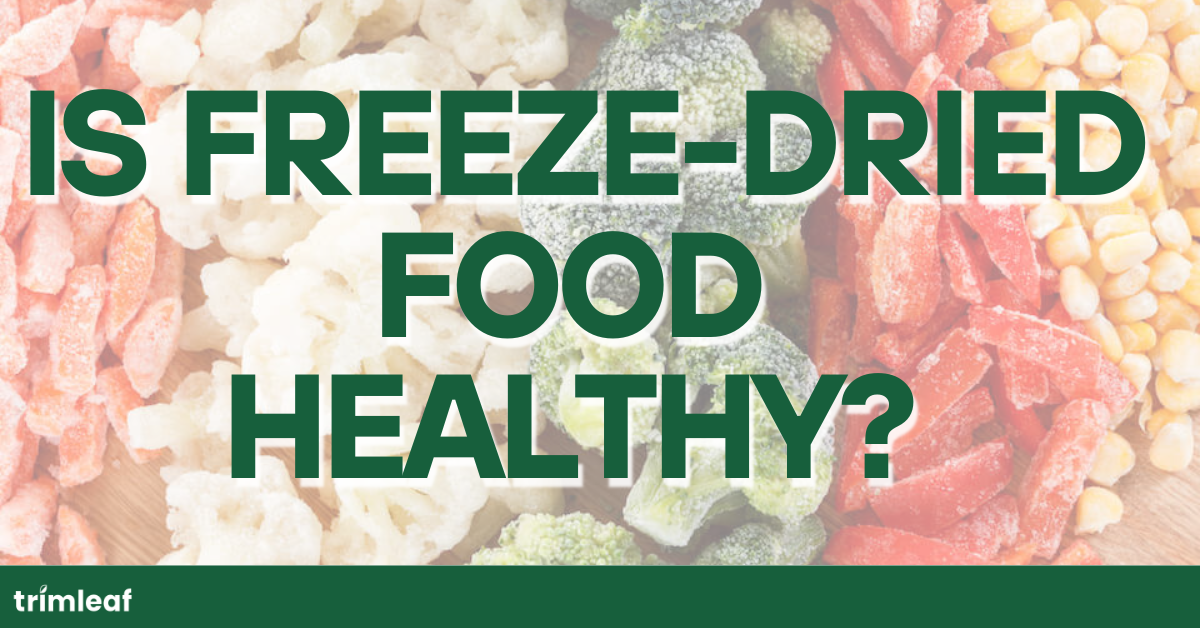
Living a healthy life often means juggling convenience and nutrition. Freeze-dried food promises both – convenient and long-lasting snacks packed with nutrients. But is it too good to be true? Freeze-dried fruits, veggies, and even meals are all the rage.
Despite its increasing popularity, many health-conscious consumers question the nutritional value of freeze-dried food.
But truth be told, freeze-dried food is healthy, and there’s nothing to worry about.
Some may consider freeze-dried food to be processed, but it's just a broad term for food altered from its original state for preservation or convenience. The only alternation in freeze drying is removing moisture from the food for a longer shelf-life.
Table of Contents
What is Freeze Drying?

Freeze-drying or lyophilization boasts a unique preservation method that promises to lock in vitamins, minerals, and flavor.
Unlike canning or dehydrating, which can degrade nutrients through heat, a freeze dryer utilizes a delicate process of freezing and removing moisture at low temperatures.
As a result, the product becomes lightweight, and shelf-stable while retaining much of its original flavor, texture, and nutritional value.
5 Nutritional Benefits of Freeze-Dried Food

Freeze-dried food offers several advantages when it comes to nutrition. Let's break down some key benefits:
- Preserves 90-95% of Nutrients - Unlike some preservation methods that use heat, freeze-drying minimizes nutrient loss. This means freeze-dried fruits and vegetables can be a great source of vitamins, minerals, and antioxidants, just like their fresh counterparts.
- Excellent Source of Fiber - Fiber is crucial for digestion, and the good news is that freeze-drying doesn't affect fiber content. So, freeze-dried fruits and vegetables contribute to your daily fiber intake as effectively as fresh produce.
- Free From Additives and Preservatives - Freeze-drying removes moisture, creating a natural barrier against bacteria and mold growth. This eliminates the need for artificial preservatives and additives, making freeze-dried food a clean and simple choice.
- Lower Sugar Content (Some Fruits) - Freeze-drying can concentrate natural sugars in some fruits, potentially lowering the overall sugar content per serving compared to very sugary fresh fruits.
- Long Shelf Life - Freeze-dried food boasts an impressive shelf life, often lasting for 25 years or more when stored properly. This extended shelf-life makes them ideal for situations where fresh produce might not be readily available, like:
- Long-term food storage
- Emergency preparedness
- Outdoor activities like camping and hiking
Potential Drawbacks of Freeze-Dried Food
While freeze-drying offers many benefits, there are some potential drawbacks to consider:
Higher Calorie Concentration - Due to their lightweight and concentrated nature, it's easier to consume more calories from freeze-dried foods than fresh options. A handful of freeze-dried fruit might contain the same calories as a larger portion of fresh fruit.
Altered Flavor and Texture - The freeze-drying process may affect texture and flavor. Freeze-dried foods are typically crunchy and may have a more concentrated flavor due to water removal. However, they return closer to their fresh form upon rehydration.
Comparing Freeze-Dried Food with Other Preserved Food
Freeze-dried food offers distinct advantages when compared to other preservation methods:
Dehydration

Freeze-dried foods also differ from foods preserved with a dehydrator. While dehydration shares similarities with freeze-drying, it utilizes heat to remove moisture.
This heat can degrade heat-sensitive nutrients like vitamin C and lead to a shorter shelf life (up to 5 years) than freeze-dried foods, which may last up to 25 years with proper storage.
Processed Foods

Unlike processed options laden with additives, sodium, and artificial ingredients, freeze-dried foods consist mainly of the original food with the moisture removed.
This lack of unnecessary ingredients makes them a healthier choice, helping you avoid health risks associated with heavily processed foods.
Frozen Foods

Freeze-dried and properly frozen foods are comparable regarding nutrient retention.
Both methods effectively preserve the nutritional content of the original produce. This makes freeze-dried food a suitable substitute for frozen options, especially when freezer space is limited or consistent access to electricity is a concern.
Therefore, while freeze-dried food is a healthy option, it should be considered a partial replacement for the benefits of fresh produce.
Fresh Produce

Despite the advantages of freeze-drying, fresh produce remains the champion in terms of nutrient diversity and texture.
Fresh fruits and vegetables offer a wider range of vitamins, minerals, and enzymes that might be partially lost during preservation.
Moreover, the taste and texture of fresh produce are often more appealing to many consumers. Therefore, while freeze-dried food is a healthy option, it shouldn't be considered a complete replacement for the benefits of fresh produce.
Making Informed Choices When Buying Freeze-Dried Food
There are plenty of options for freeze-dried food in the market but go for products that do not contain any other ingredients besides the original food item.
To navigate it effectively and maximize the nutritional benefits, here are some tips:
✓ Check the Label - Reading food labels is crucial. Check for added sugars, sodium content, and suggested serving sizes. Freeze-dried food's lightweight nature can tempt overconsumption, so portion control is essential.
✓ Beware of Added Sugars and Sodium - These ingredients can alter the natural flavors and potentially contribute to unwanted sugar or sodium intake. Opt for products with minimal or no added sugars and sodium.
✓ Prioritize Whole Foods - Look for options containing just the original food item, free from unnecessary additives. This ensures you're getting the most natural and nutrient-rich freeze-dried products.
Conclusion
Freeze-dried food offers a compelling combination of convenience and nutrition. It boasts a long shelf life, retains most nutrients, and eliminates the need for additives.
However, it's important to remember that freeze-dried options should be used as a supplement, not a replacement, for fresh produce. Fresh fruits and vegetables provide the full spectrum of nutrients and unbeatable flavor.
Ready to delve deeper? Here are some additional resources to explore:
- Is Freeze-Dried Fruit Healthy? What You Need to Know
- How To Freeze Dry Food At Home
- How Does Freeze Drying Work?
- The Best Home Freeze Dryers
By incorporating a variety of fresh and freeze-dried options, you can create a more diverse and nutrient-rich diet, keeping things interesting and your body fueled for optimal health.
Frequently Asked Questions About Freeze-Dried Food
- ◄What should I look for when buying freeze-dried food?
- Look for options with minimal added sugar and a variety of fruits and vegetables. This ensures you're getting a more nutritious option with less processed ingredients.
- ◄Can I make my own freeze-dried food?
- Yes, home freeze dryers are available, but do note that they can be pricey. A reputable brand in like Harvest Right offers various models of home freeze dryers.
- ◄How do I rehydrate freeze-dried food?
- Rehydration methods vary depending on the food. Most require soaking in water or broth for a specific time. Always follow the instructions on the packaging for optimal results.
- ◄Can I cook with freeze-dried food?
- Yes, you can use freeze-dried food in various recipes after rehydration. This adds versatility and convenience to your meal planning. Simply rehydrate the food according to the package instructions and then incorporate it into your recipe as you would with fresh ingredients.
- ◄How long does freeze-dried food last?
- Freeze-dried food can last for several years when stored properly in a cool, dark place. Proper storage is key to maintaining quality and shelf life. Look for airtight containers and avoid exposure to heat and light.
- ◄Is freeze-dried food good for weight loss?
- Freeze-dried food can be part of a healthy weight loss plan, but be mindful of portion sizes due to the concentrated calories. While freeze-drying preserves nutrients, the process concentrates the calories in the food. Pay attention to serving sizes and focus on incorporating freeze-dried food into a balanced diet for weight loss.
- ◄Are there any health concerns with freeze-dried food?
- For most people, freeze-dried food is safe. However, if you have allergies to specific fruits or vegetables, be cautious, as freeze-drying doesn't eliminate allergens. Always check the ingredients list before consuming.
- ◄Does freeze-dried food taste the same as fresh food?
- The taste and texture of freeze-dried food differ from fresh produce. Freeze-dried food tends to be crunchier and have a more intense flavor due to water removal. Rehydration helps it return closer to its fresh form, but some taste and texture differences may remain.
- ◄Are there any ethical considerations with freeze-dried food?
- Some concerns exist regarding the energy consumption required for freeze-drying. Additionally, some commercially produced options might have added sugars or other ingredients, so be sure to check labels for ethical sourcing and minimal processing. Look for companies committed to sustainable practices and transparency in their ingredients.
- ◄How does freeze-dried food compare to freeze-thaw-dried food?
- Freeze-thaw-drying is a similar process but uses a single-step freezing and drying chamber. It's generally less common and might have slightly lower nutrient retention compared to the two-step process of freeze-drying. Freeze-drying typically involves freezing the food first, then drying it under a vacuum. This two-step process helps preserve more nutrients than freeze-thaw-drying.




